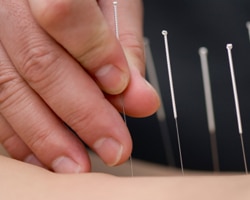
Are you still skeptical that pins can heal your ills? I understand your doubts.
My mother is a practicing nurse and my father has a PhD in chemistry. It’s no surprise that in school my favorite classes were the sciences. I did well in chemistry, biology, and math because the answers were concrete, and could be "proved" … at least so I thought.
During my first year of undergraduate study, I enrolled in a program called Akademia. It was unique because it offered courses that were a blend of arts and science. For example, the "Whales for Sale" class blended ecology and economics, and the "Discovery of Insulin” class combined history with research.
After one semester I knew that sciences were my calling, so I switched into the Human Kinetics B.Sc. program. At the time, I did not know about acupuncture or other "alternative" practices yet. Since I didn't even believe there was any benefit from taking multivitamin supplements, surely I would have thought these options quackery as well.
After graduating, I went to Japan to work as a research assistant at a medical university. My eyes were opened when I saw, first hand, that science and research could show bias and be misunderstood. My faith in science was shaken. At the same time, I was also exposed to holism which is a different way of thinking than reductionism.
Reductionism is a Western viewpoint that complex systems can be broken down and understood by looking at their simpler parts.
Holism is predominately an Eastern viewpoint wherein any system cannot be explained solely by looking at the parts, but must be taken as a whole to study the interactions.
A simple way to differentiate between these basic philosophies is portrayed in society. Look at the emphasis placed in the Western world on individualism and self-determination. Go to the self-help section in any bookstore and you will see a plethora of such examples. In Japan, however, emphasis is placed on the group, be it country, company or community. It is encouraged to do more for the group, even to the detriment of the individual. Both ways of thinking are important, but an extreme in either viewpoint creates imbalance and problems.
Through synchronicity, I began to study Traditional Chinese Medicine (TCM). It feels appropriate that the life I choose is a blend of art and science, just as I studied during my first year of university. Bridging the gaps between eastern and western philosophies, and between the arts and sciences, is my passion.
Benefits of Acupuncture
- Acupuncture increases local blood circulation. Blood carries in nutrients and moves out toxins and waste products.
- Acupuncture affects responses of the brain. Since the brain receives and sends signals to the rest of the body, it is important to see if the brain responds differently to real acupuncture than to pretend (i.e. sham) acupuncture. It does.
- Classic acupuncture points, used for treating body parts located away from the point’s location, actually do affect the body part they are intended to treat. For example, a classic point on the foot meant to treat vision, does indeed affect the same parts of the brain that are stimulated when light is flashed in the eye.
- Acupuncture treats chronic elbow pain
- Acupuncture helps with chronic headaches
- Acupuncture helps with seasonal allergies
Everyone has a different perception of their acupuncture experience, so it's something each person should consider when faced with health issues.




